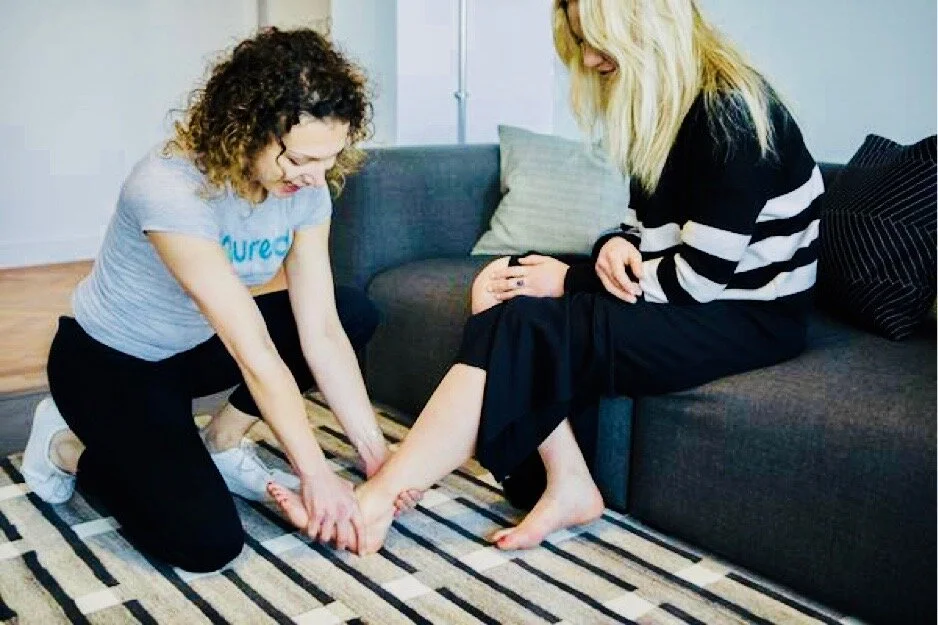Physiotherapy: What Every New Mom Needs
Pregnancy puts a huge amount of pressure on the body. Indeed, carrying and delivering a baby is far (very far!) from a walk in the park and can lead to pain and discomfort from a number of physical issues. Physiotherapy may not be an option that you have considered before, but it can be a great way to address issues that you might have thought were unavoidable side effects of pregnancy. That's why we're thrilled to be featuring this post, all about physiotherapy for new mothers, written by Trudy Wood, Head of Physiotherapy at Qured Healthcare.The use of postpartum physiotherapy should be viewed as far more than a simple luxury. While in the UK women get little more than a 6-week postpartum check-up, the French government provides all with women with ‘la rééducation périnéale’ – up to 10 sessions of treatment to strengthen the abdominal muscles and help restore the pelvic floor following childbirth. We’ve had a look at some of the physical problems new mothers might face that diagnosis, treatment and advice from a physiotherapist can help to rectify. Voilà!
Pelvic Floor Disorders
The intimate workings of the pelvic floor – the complex system that supports the bladder, uterus, vagina and rectum and helps them to function – still remain somewhat of a mystery to scientists. It's all the more surprising, noting that almost 1/4 of women in the United States have a pelvic floor disorder, and at least 1/3 of UK women have suffered postnatal urinary incontinence - just one of many disorders related to the pelvic floor.Indeed, while pregnancy is not the only cause of pelvic floor disorders, childbirth can lead to pelvic floor trauma, perineal tears and pudendal nerve injury, which in turn can cause the pelvic floor can become dysfunctional. As a result, new mothers may experience urinary or bowel incontinence, urinary frequency, incomplete emptying, pain on urination, and pain or discomfort with sexual intercourse.The good news is, assessment and treatment from a physiotherapist can help with these issues. Following a detailed examination and assessment (including of your fitness activities), treatment could include exercise, manual treatment of the muscles and advice about good bowel habits and daily activities.
Back pain
Postpartum back pain is extremely common, affecting around one third of women (UPMC), and can result from stresses on your body both during and after pregnancy. In addition to the stress that delivery itself can put on your back, extra weight during pregnancy puts strain on your muscles, and hormonal changes can loosen joints and ligaments. Moreover, during pregnancy the uterus expands and weakens the abdominal muscles, which in turn alters your posture and puts strain on your back.What’s more, even once you’ve welcomed your baby to the world, incorrect posture while breastfeeding or simply holding your baby can strain muscles and cause further backache.Faced with the overall stress and time that goes into looking after a new-born, back pain can be seen as an inevitable side-effect of life as a new mother, something you just have to accept. However, a physiotherapist can help to combat postpartum back pain, so it's not something you have to live with. Through manual therapy, advice on lifestyle changes or a tailored exercise program, physiotherapy experts help can get you fighting fit and ready to handle your baby care free, and back pain free.
Separated Stomach Muscles (aka Diastasis Recti)
During pregnancy, the two abdominal muscles that run down the middle of your stomach can separate, a complaint that is called diastasis recti. The amount of separation and the position of the split varies between women and occurs when the growing womb pushes the muscles apart, in turn making them weaker and longer.While your stomach should return to normal in around 8 weeks, if there is still a clear gap after this period it could mean that the muscles are still weak, putting you at risk of additional back pain. A GP will often refer you to a physiotherapist who can advise you on exercises to rectify this and reduce the size of the separation. The may also recommend that you avoid exercises such as crunches, sit-ups, press-ups and push-ups which can the make abdominal separation worse.It’s easy to check the degree of separation. To do so, lie on your back with your legs bent and feet flat on the floor. Slightly raise your shoulders and look down at your stomach and feel between the edges of the muscles, above and below the belly button. Note how many fingers you can fit into the gap between your muscles and use this to track if the separation is decreasing. Two finger tips indicates that you likely still have abdominal separation, whereas one finger tip is the normal gap width.
Potentially Invaluable Treatment
Pelvic floor disorders, back pain and separated stomach muscles are just a handful of the postpartum issues that physiotherapy can help to rectify. Physiotherapy can also help with issues including circulation, bowel issues and any general aches and pains, using a variety of methods of methods from manual treatment to personalized advice on maintaining healthy bodily and movement habits.Physiotherapy will help you take care of your physical body, giving you more time and freedom to take care of and enjoy your baby!
With physiotherapy from Qured, you can receive treatment from a highly experienced practitioner in the comfort of your own home. Booking via our easy-to-use app, a physio will come to you within 2 hours, or you can book up to 48 hours in advance, all at an affordable cost. For more information and to find out if Qured is available near you, head on over to www.qured.com

